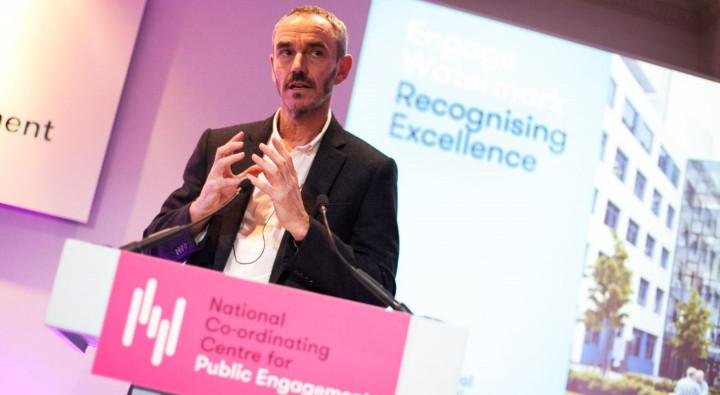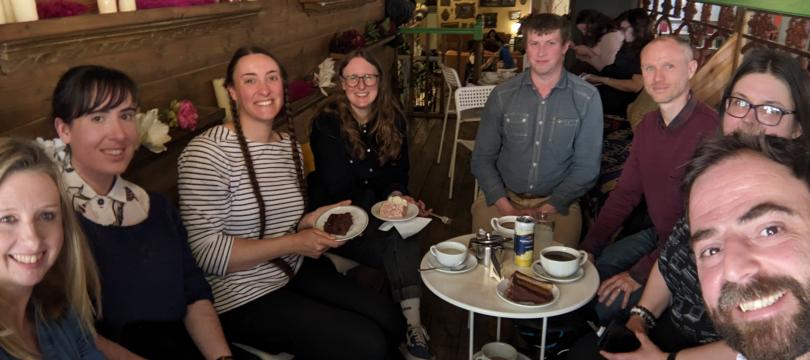Celebrating with the Knowledge Exchange extended family: the launch of the KE Concordat repository
By NCCPE Co-Director, Paul Manners

21 / 07 / 2023
This week the Knowledge Exchange Concordat has launched a repository of resources to support the Knowledge Exchange community. The launch event saw framing remarks from KE ‘champion’ and VC at Keele University, Trevor McMillan and then a variety of case studies.
It provided an excellent moment to take stock of our progress in the knowledge exchange space, and the role of Public Engagement within this.
A garden of delights
Dip into the resources and you will be greeted with a wonderfully eclectic mix of content – from NCCPE resources around participatory research to guides to Licensing and IP. Seeing the fruits of our collective labours in the Knowledge Exchange (KE) space lined up alongside each other (rather than in separate silos) reflects what a journey we’ve been on to work in a much more joined up way across the KE community over the last couple of years.
Joining the event – and having participated in lots of other KE Concordat webinars over the last couple of years – reminded me how great it is to be in the same room as people working in very different knowledge exchange niches. Just some of the specialisms represented in the event and in the repository include:
- Business engagement and commercialisation
- Policy engagement
- Public, community and civic engagement
- Cultural engagement
- Health: patient and public involvement and knowledge mobilisation
- Legal and administrative support for collaborative research and innovation
Listening to the case study presenters and dipping into the resources made clear how much unites all of us working in the KE space. For instance, whether talking about business engagement or public engagement, speakers and participants spoke passionately about the need to respect your collaborators’ expertise, to embrace co-creation and to focus on equity.
A principled approach
The Concordat helps define what unites us. It is built around eight principles which capture the fundamental dynamics of good collaborative knowledge-building practice. These have provided a framework to allow us to share good practice in our different domains and across our different specialisms.
The event – and the resources – also made clear that although the principles might be simple, ‘doing’ KE is very demanding. Exceptional artistry, technical skills and deep knowledge are required, along with highly developed ‘people-skills’. While needing to work with common purpose, we also need to nurture and invest in these specialist skills.
Public engagement as part of the KE Family
The event also made clear how embedded in the KE family public engagement now is. When the NCCPE started we were given a very clear steer to ‘stay in our box’ and just focus on building capacity in public engagement. How things have changed. The work we have done collectively to build capacity in public engagement and to develop tools and frameworks to enhance culture and practice are now being taken up widely. Public engagement professionals have played a vital, catalytic role.
The eight Concordat principles reflect closely the nine dimensions of the NCCPE’s EDGE tool, for instance highlighting the critical importance of ‘mission’ driven leadership; investment in capacity building; and attention to reward and recognition. These are the same focal points which we worked with Research England to ensure that they were embedded in the KEF Public and Community Engagement narrative guidance.
In his opening remarks, Trevor McMillan reflected on how powerful it is that now so many of the KE frameworks aligning meaningfully. He spoke about how the alignment between the KEF Public and Community Engagement Narrative and the KE Concordat Action Planning process enabled really productive joined up thinking across his university.
And it’s not just that we are increasingly working with shared frameworks. We are also getting better at working collaboratively across our professional niches. The first case study at the event was an inspiring example from Newcastle University where the Director of Business Development and Enterprise described how he and the Head of Public Engagement worked closely together to align activity across the NCCPE Engage Watermark and Concordat action planning. This way of working has allowed the university to develop an integrated and strategic approach uniting their research, innovation and civic ambitions.
Knowledge exchangers to the rescue
This much more joined up approach is timely and long overdue. UKRI’s new strategy commits the sector to rapidly increasing our contribution to economic and social renewal. Its strategic themes and many of its cross-cutting programmes are ‘mission-led’ and commit us to delivering a rapid and profound social impact from research and innovation. REF 2028 demands a step change in our professional culture and in the rigour of our professional support for engagement and impact.
These changes have to be people-powered, and UKRI’s corporate strategy provides a very eloquent description of the kinds of people (and expertise) that we will need to drive this change: exactly the family of people who were in the room for this event, and of which PEPs are a vital part:
We need people that can fill the middle ground and build connections between stakeholders; understanding and realising the impact and societal benefit of our investment in R&I.
Our family values
So what is it that unites us? What are the values and kinds of expertise that connect public engagement professionals with others in the KE family? As I listened into the presentations and browsed the resources that NCUB have compiled, I tried to distil the specific kinds of expertise which people in the room embody:
- Client intelligence: a deep understanding of the needs, cultures and practices of different stakeholders and collaborators
- Engagement expertise: methodological expertise in a variety of engagement mechanisms, including user-led design, co-production and participatory practice, and in partnership development and management
- Ethical and commercial expertise: expertise in managing the risks and benefits of collaborative research
- Project management and leadership: impact-focused and collaborative research, innovation and KE requires advanced skills in planning and project leadership
- Understanding of culture change: KE professionals have significant experience of supporting capacity building and improvement processes, including through the design of evaluation and other monitoring processes, and through their commitment to addressing areas like openness, transparency and integrity
Taking things to the next level
These are exciting times – though we are also aware that professional staff across the sector are currently working at an unsustainable pace and often in very precarious conditions. We should feel really proud of what we have achieved and be more confident in promoting this and making more of our collective achievements.
The event also left me hungry for more confidence, risk taking and creativity across the KE community. How can we build on these foundations and begin to exert more leadership within our institutions? And how can we challenge each other, to really push the boundaries of what a genuinely joined up and strategic approach to KE might look like?

